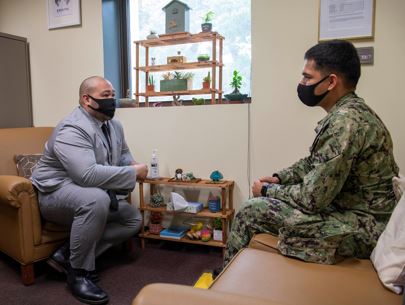By Dr. Justin Curry
July 25, 2022

U.S. Navy photo by Mass Communication Specialist 1st Class Jeremy Graham
Serving in the military can be a stressful experience for anybody. Long hours, difficult work, and separation from established support systems can all contribute to feelings of sadness, anxiety, loss of focus, or a sense of being overwhelmed (symptoms of psychological distress). For service members who belong to traditionally underserved groups, the stress can be even greater.
For a multitude of reasons (historical, cultural, social, etc.), different segments of the U.S. population experience health and healthcare in quantitatively and qualitatively different ways. Traditionally, minority groups in the United States have faced some combination of increased risk of illness, greater disease burden, reduced access to healthcare services, or higher mortality/morbidity. 1 These different experiences of health and health care are compounded by institutional and systemic stressors and discrimination.
July is National Minority Mental Health Awareness month – a time for health care organizations, providers, non-profits, and health advocacy groups across the country to reflect on how race and mental health interact in our society and how disparities can be addressed. While, in theory, one might expect the universal healthcare provided in the Military Health System (MHS) to address race-based disparities, in practice that turns out not to be the case. Group differences in access-to-care may be minimized (at least for active duty service members in the MHS), but race-based vulnerabilities remain.
Across the MHS in calendar year 2021, nearly 250,000 active duty service members (a little more than 18% of the active duty force) were treated as outpatients for mental health or substance abuse concerns in military treatment facilities. Asian/Pacific Islander, and Native American/Alaskan Native service members were seen roughly as often as white service members. Black service members, on the other hand, were 1.4 times more like to be seen for mental health or substance abuse issues than were white service members. Even more striking, service members of racial backgrounds other than Black, Asian/Pacific Islander, or Native American/Alaskan Native were more than twice as likely (2.2 times) to receive mental health or substance abuse care as were their white counterparts.2 A recent RAND report (2021) commissioned by the Psychological Health Center of Excellence, The Behavioral Health of Minority Active Duty Service Members, found that non-Hispanic Black and Hispanic service members had higher rates of suicide attempts compared to white service members.3
Whether the discrepancies noted above reflect differences in help-seeking or differences in disease prevalence is difficult to determine without further study. What is clear, however, is that mental health concerns appear to impact different racial groups differently even in the MHS. Health care providers in our system need to be aware of this trend in order to deliver more relevant and impactful care. Leaders at all levels need to consider why certain racial groups may be disproportionately affected by mental health and substance use concerns and to identify systemic factors that may contribute to this health disparity.
References
-
Office of Minority Health. (2021, October 12). Minority Population Profiles. U.S. Department of Health and Human Services. https://www.minorityhealth.hhs.gov/omh/browse.aspx?lvl=2&lvlID=26
- U.S. Department of Defense (2022, July 11). [Administrative health data query] [Unpublished raw data]. Military Health System Management and Reporting Tool.(M2)
- Wong, E. C., Meadows, S. O., Schell, T. L., Chan, W. Y., Jaycox, L. H., Osilla, K. C., Schuler, M. S., & Roth, E. (2021). The Behavioral Health of Minority Active Duty Service Members. RAND Corporation. https://www.rand.org/pubs/research_reports/RR4247.html
Justin Curry, PhD serves as the Chief of the Surveillance Section at the Psychological Health Center of Excellence. He is a clinical psychologist by training and a veteran of the US Army.